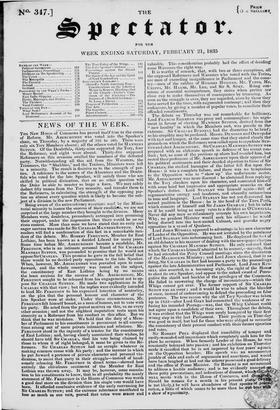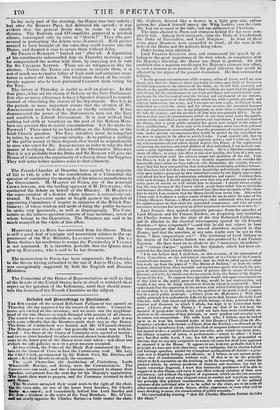NEWS OF THE WEEK.
Being aware of the extraordinary exertions used by the Minis- terial minority to insure the success of their candidate, we are not surprised at the large number they brought to the division. Many Members were, doubtless, prematurely entrapped into promising their support, under the impression that there would be no se- rious contest. More than once we have stated that an early and eager canvass was made for Sir CHARLES MANNERS SurroN. Our readers will find a confirmation of this fact in a remarkable inci- dent of the debate. Mr. ROBERT FERGUSON, Member for East Lothian, has been known as a decided Liberal for many years. Some time before Mr. ABERCROMBY became a candidate, Mr. FERGUSON, who is an intimate personal friend of Sir CHARLES MANNERS SurroN, was persuaded to promise that he would not opposeSirCHARLEs. This promise he gave in the full belief that there would be no decided party opposition to the late Speaker. When, however, Mr. ABERCROMBY was prevailed upon to come forward, and the whole country was roused on the subject, the constituency of East Lothian being by no means the least anxious for the success of Mr. ABERCROMBY, Mr. FERGUSON sought to be released from his engagement not to op- pose Sir CHARLES SUTTON. He made two applications to Sir CHARLES with that view ; but the replies were evidently intended to bind Mr. FERGUSON to his expressed intention of neutrality, on the plea that the personal honour and character of the late Speaker were at stake. Under these circumstances, Mr. FERGUSON felt himself bound, as a man of honour, not to vote with his party. He acted from the purest motives on this, as on every other occasion; and not the slightest imputation rests upon his sincerity as a Reformer from his conduct in this affair. But we think that he was mistaken. We hold that the duty of a Mem- ber of Parliament to his constituents is paramount to all conven- tions arising out of mere private intimacies and relations. Mr. FERGUSON stood in the capacity of a trustee for the constituency of East Lothian; and, having clearly ascertained their wishes, he should have told Sir CHARLES, that his vote being claimed by those to whom it of right belonged, it must be given to the Re- formers. Sir CHARLES SurroN had no scruple whatever in making common cause with his.party : and the manner in which he put forward a pretence of private character and personal vin- dication, to assist that party in their struggle—instead of hand- somely releasing Mr. FERGUSON in direct terms—showed how entirely the chivalrous sentiment of the Member for East Lothian was thrown away. It may be, however, some consola- tion to his constituents to know, that in all probability the manly statement of Mr. FERGUSON in the House of Commons was worth a geed deal more on the division than his single vote would have been. It afforded conclusive evidence of the early canvassing for Sir CHARLES SUTTON; and the extreme reluctance manifested to lose SO much as one vote, proved that votes were Scarce and
valuable. This consideration probably had the effect of deciding some Waverers the right way. It is worthy of remark, that, with two or three exceptions, all the supposed Reformers and Waverers who voted with the Tories, are men of exceeding insignificance in Parliament and the comn.
try—men of the calibre of HUGHES HtronEs, Mr.. TAPP% Mr, CRIPPS, Mr. HALSE, Mr. LEE, and Sir S. SPRY. Being con- scious of essential unimportance, they strive when parties any close run to make themselves of consequence by trimming. As soon as the struggle is over, they are regarded, even by those they have served for the time, with augmented contetnpt; and then they endeavour, by giving a number of popular votes, to conciliate their offended constituents.
The debate on Thursday was not remarkable for brilliancy, Lord FRANCIS EGERTON was prosy and commonplace: his argu- ment in favour of electing MANNERS SurroN, derived from the " new locality" ill which the Members met, was puerile in the extreme. Sir CHARLES BURRELL had the discretion to be brief; so his stupidity may be pardoned. Messrs. DENISON and ORD spoke with tact and temper, at the same time that they stated clearly the grounds on which the Reformers were called upon to repudiate SUT- TON and elect ABERCROMBY. SirCHARLES MANNERS SUTTON was, prepared with an elaborate speech in defence of his recent con-, duct ; but, as none of the previous sp:akers had assailed him, but rested their preference of Mr. ABERCROMBY upon their approval of his political sentiments and their decided objection to those of Sir CHARLES, the studied harangue of the latter fell fiat upon the House : it was a complete failure, and there was no tearytatims to the Opposition wits to " show up" the unfortunate orator: Mr. ABERCROMBY was more discreet : he abstained from replying to the Tory slanders upon his character, and contented himself' with some brief but impressive and appropriate remarks on the Speaker's duties. Lord STANLEY was himself again—full of argumentative energy and insolence, and absurdly acrimonious in tone and language. Lord STANLEY has not vet discovered his actual position in the House : he is the head of the Tiers Para, which consists of himself and Sir JAMES GRAHAM; but he talke as if he could bring as many votes to a division as O'CONNELL. Never did any man so ridiculously overrate his own importance. Why, no prudent Minister would seek his alliance: he would bring discord into the best-united Cabinet, and provoke angry - opposition in a synod of Quakers. Lord JOHN RUSSELL appeared to advantage in his new character of Leader of the Opposition. He was not irritated by the petulance of Lord STANLEY into unbecoming heat. He displayed the tact of an old debater in his manner of dealing with the newspaper charges against Sir CHARLES MANNERS SUTTON. He only enforced that which Sir CHARLES himself admitted to be correct,—nateely, that he had attended the Privy Council meetings since the dissolution of the MELBOURNE Ministry ; and Lord Jonsr showed, that in se doing, Sir CHARLES in fact had become a party to the proceedings against the late Administration and Parliament. Lord JOHN RUS- SELL also asserted, in a becoming style, the right of the House to elect its own Speaker, and oppose to the naked sword of Prero- gative the shield and buckler of the privileges of the Commons. He failed in answering the charge of inconsistency—which the Whigs cannot get over. The former support of Sir CHARLES SUTON was an error ; and it would be wise to admit the blunder at once, instead of endeavouring to defend the proceeding on false pretences. The true reason wriy the old Tory Speaker was taken up in 1833—after Lord GREY had committed the weakness of re- fusing his intended Peerage—was, that the Whig Cabinet could not agree upon a candidate of their own. Throughout the debate, it was evident that the Whigs were sorely hampered by their first wrong step in the last Parliament. Their position on Thursday was good in itself, but bad for those who were obliged to reconcile the consistency of their present conduct with their former speeches and votes.
Sir ROBERT PEEL displayed that irascibility of temper and easily-wounded self-importance which completely unlit him for the place he occupies. When formerly Leader of the House, he was constantly betrayed into passion ; and his exhibition on Thursday made it manifest that he is not improved by four years' sojourn on the Opposition benches. His speech was an unconnected jumble of odds and ends of arguments and assertions, and would have been laughed at had not the utterer possessed a good delivery and the office of Prime Minister. Sir ROBERT is not accustomed to address a hostile audience; and is too evidently annoy those petty provocations, and indications of dissent, whickke NELL meets with in the house of Commons, and Os Should he remain for a month in his present pla 1h. is not likely,) he will have abundance of that species of prey cation, a little of which seems to be more than he can bear with a show of eluanimity. In the early part of the evening, the House was very orderly ; but after Sir Roaster PEEL had delivered his speech ; it was evident that the general desire was to come to a speedy division. The Radicals and Otonnellites preserved a prudent silence, interrupted only by cries of "Divide r They who per- severed in protracting the debate were ill-received. Both parties seemed to have brought all the votes they could muster into the House, and deemed it wise to secure them without delay.
Sir FRANCIS Buenerr "backed out " after all. A deputation of his constituents unkennelled him on Thursday morning ; and be compromised the matter with them, by engaging not to vote for Sir CHARLES SUTTON. There are no whippers-in like the electors. Unless the Tories can continue to muzzle them, it is not of much use to employ ladies of high tank and notorious repu- tation to seduce old beaus. The wholesome dread of his consti- tuents appears also to have prevented Cosmerr from voting for
the Tory. •
The victory of Thursday is useful as well as glorious. In the first place, it has set the stamp of Reform on the New Parliament. It is also no mean advantage to base a Speaker disposed to remedy instead of cherishing the abuses of his department. But it is as the prelude to more important events that the election of Mr. Aszeceniewit must be looked upon as chiefly valuable. It has demonstrated the power of the Reformers to turn out the Tory and establish a Liberal Government. It is now evident that nothing but sloth or treachery on the part of the Reform Mem- bers can prevent this desirable consummation. Let the motto be, Forward ! There must be no backsliding on the Address, or the Irish Church question. The Tory intruders must be compelled to retire, by a series of vigorous attacks. As to putting a shilling of the public money at their disposal, that would be unpardonable in men who voted for Mr. ABERCROMHY in order to take the first means of testifying their distrust of the Obstructive Ministers. But it is not probable thatthe Duke and Sir ROBERT will give the House of Commons the opportunity of refusing them the Supplies. They will retire before matters come to that extremity.

























